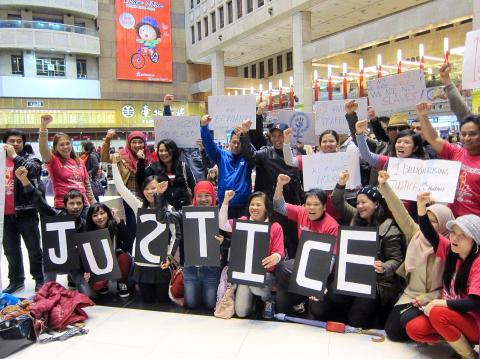Foreign workers and rights advocates yesterday staged a flash mob demonstration in the lobby of the Taipei Railway Station, urging the government to extend the protection of the Labor Standards Act (勞動基準法) to all foreign workers, and calling attention to the abuse of migrant workers.
At 11:30am, a group of migrant workers from the Philippines and Indonesia, as well as rights advocates from Taiwan and Malaysia, showed up in the lobby of the Taipei Railway Station unexpectedly, dancing to Philippine music while holding signs in English that read: “Justice to all migrant workers” and “we are women, we are workers, we are not slaves.”
“Ladies and gentlemen, we are here to show our support to migrant workers in Taiwan and elsewhere, to call on the government to grant equal rights to migrant and Taiwanese workers,” members of Philippine workers’ organization Migrante International and Indonesian workers’ organization ATKI-Taiwan told onlookers drawn by the music and the dance in Mandarin and Indonesian through loudspeakers.

Photo: CNA
“We also need your support in our campaign. Please join us in our action if you would, thank you very much,” they added.
Event spokesman Wong Ying-dah (汪英達) said there is a globally coordinated campaign in which rights advocates are to show up unexpectedly in public places and dance to raise public awareness about women’s rights on Valentine’s Day.
“However, we feel that in Taiwan, foreign domestic helpers — who are mostly women — are in worse conditions, so we decided to focus the campaign on the issue of migrant workers,” Wong said, adding that since this year’s Valentine’s Day falls on Friday and most foreign workers have to work, they decided to move the event to yesterday instead.
“Working conditions are bad for foreign domestic helpers, because they are not covered by the Labor Standards Act, so while the legal monthly minimum wage is more than NT$19,000 [US$626], foreign domestic helpers are getting only NT$15,840 — and their actual salary is lower after deductions,” Wong said. “In addition, as domestic helpers, they usually have to be on standby 24 hours a day, and many of them rarely get days off.”
AKIT-Taiwan president Lukman, a factory worker from Indonesia, echoed Wong, saying that one of his organization’s members had only one day off a year.
“And whether you’re working at someone’s home or at a factory, you can only get NT$12,000 to NT$13,000 a month on average, after deductions,” Lukman said. “That’s why we’re calling for help from the Taiwanese government.”

AGING: As of last month, people aged 65 or older accounted for 20.06 percent of the total population and the number of couples who got married fell by 18,685 from 2024 Taiwan has surpassed South Korea as the country least willing to have children, with an annual crude birthrate of 4.62 per 1,000 people, Ministry of the Interior data showed yesterday. The nation was previously ranked the second-lowest country in terms of total fertility rate, or the average number of children a woman has in her lifetime. However, South Korea’s fertility rate began to recover from 2023, with total fertility rate rising from 0.72 and estimated to reach 0.82 to 0.85 by last year, and the crude birthrate projected at 6.7 per 1,000 people. Japan’s crude birthrate was projected to fall below six,

US President Donald Trump in an interview with the New York Times published on Thursday said that “it’s up to” Chinese President Xi Jinping (習近平) what China does on Taiwan, but that he would be “very unhappy” with a change in the “status quo.” “He [Xi] considers it to be a part of China, and that’s up to him what he’s going to be doing, but I’ve expressed to him that I would be very unhappy if he did that, and I don’t think he’ll do that. I hope he doesn’t do that,” Trump said. Trump made the comments in the context

SELF-DEFENSE: Tokyo has accelerated its spending goal and its defense minister said the nation needs to discuss whether it should develop nuclear-powered submarines China is ramping up objections to what it sees as Japan’s desire to acquire nuclear weapons, despite Tokyo’s longstanding renunciation of such arms, deepening another fissure in the two neighbors’ increasingly tense ties. In what appears to be a concerted effort, China’s foreign and defense ministries issued statements on Thursday condemning alleged remilitarism efforts by Tokyo. The remarks came as two of the country’s top think tanks jointly issued a 29-page report framing actions by “right-wing forces” in Japan as posing a “serious threat” to world peace. While that report did not define “right-wing forces,” the Chinese Ministry of Foreign Affairs was

PREPAREDNESS: Given the difficulty of importing ammunition during wartime, the Ministry of National Defense said it would prioritize ‘coproduction’ partnerships A newly formed unit of the Marine Corps tasked with land-based security operations has recently replaced its aging, domestically produced rifles with more advanced, US-made M4A1 rifles, a source said yesterday. The unnamed source familiar with the matter said the First Security Battalion of the Marine Corps’ Air Defense and Base Guard Group has replaced its older T65K2 rifles, which have been in service since the late 1980s, with the newly received M4A1s. The source did not say exactly when the upgrade took place or how many M4A1s were issued to the battalion. The confirmation came after Chinese-language media reported